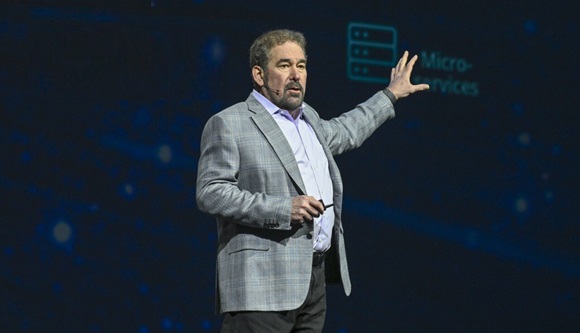Pega CEO Trefler: Avoid the ‘birth of legacy systems’ via workflow automation
Pega staged the 2024 iteration/era of its Pega World iNspire user, customer, partner & practitioner conference in Las Vegas this week.
The enterprise AI decisioning and workflow automation platform provider brought forward (no drum roll needed: we all know how platform vendors are extending their technology stacks these days) a whole batch of AI enhancements spanning both generative artificial intelligence and ‘old fashioned traditional’ AI i.e. the latter being those technologies more directly used for business decision-making rather than creative generation.
How legacy happens
Alan Trefler, Pega founder and CEO kicked off the event with a description of ‘how legacy is born’ by explaining how enterprise technologies are built in a way that is too insular in terms of workflows being aligned to an individual segmenting technology such as a Customer Relationship Management (CRM) system, an Enterprise Resource Planning (ERP) platform, or indeed due to some alignment with the front end GUI.
Instead, for preference that leads to freedom, flexibility and functionality (he says), organisations can look at using a workflow automation solution to elevate and abstract workflow processes above these sometime-archaic systems but still make use of an ERP or CRM or FSM or other solution to exist as a system of record that serves the workflow solution at a higher level.
Work = cases, steps, steps & personas
How does a workflow automation company break down work so that it can be encoded into digital platform environments so it can managed through a platform such as Pega?
Trefler says that Pega’s understanding of ‘how work works inside workflows’ comes down to being able to detail cases, steps, steps and personas that all come together in the workplace.
Keynote duties were handed over to Steph Louis, sr director for digital client success and experience and Matt Nolan, sr director of product marketing. With a segue into a session showcasing a spokesperson from the US Department of Veterans Affairs, the audience heard a use case designed to explain how the department uses Pega to streamline new user enrollment processes and to improve the overall veteran experience.
After other user sessions hosted by organisations including US mobile provider T-Mobile, press and analysts had extra time to review Pega’s newsreel for this event.
The Socratic Method
All well and good then, but to seed, deploy and develop competencies with workflow automation technology, a further step is needed. Trefler and team think that they have that up their sleeve too.
Pega World iNspire 2024 saw the launch o Pega GenAI Socrates, a generative AI tutor that dynamically teaches core Pega skills to clients and partners. In a departure from traditional online corporate learning, Pega GenAI Socrates fosters an interactive dialogue that constantly adapts to each student’s (i.e. user’s) vertical industry, skill level and learning needs. This helps users learn Pega faster and more effectively while retaining more knowledge, resulting in a more deeply skilled workforce.
The company suggests that most people crave learning new skills nearly as much as they loathe the boring methods by which corporations usually teach them. Students suffer through tedious lecture-based courseware that puts more value on memorisation than understanding concepts.
“Rather than engaging with you, traditional courses talk at you with one-size-fits-all lessons regardless of skill level. The content is usually 90% forgotten within a month, resulting in severe skills gaps throughout the organization. The growth of Pega technology adoption has created tremendous demand for Pega skills around the world,” said Mary Tafuri, vice president, global go-to-market enablement and effectiveness, Pega. “Pega GenAI Socrates not only helps us meet this demand, it delivers a modern personalised learning experience that uniquely replicates how a human would teach on a massive scale. This is just the beginning of what we think Pega GenAI Socrates can do for our employees, clients and partners.”
Available within select Pega Academy courses, Pega GenAI Socrates provides an on-demand tutor for corporate online learning.
Inspired by the Socratic teaching method (any educational strategy that involves the cross-examination of students by their teacher), Pega GenAI Socrates educates students through a two-way conversation interspersed with open-ended questions on each learning objective – just as an engaged human teacher would in a classroom.
Pega GenAI Socrates instantly personalises lessons to address students’ weak spots while also helping them better grasp and internalize their newfound knowledge.
“Pega GenAI Socrates teaches and assesses students by prompting them to analyse real-life scenarios in their own words instead of hiding behind passive multiple-choice answers. This immediate application of new skills leads to deeper understanding and retention. The platform also incorporates multimedia elements such as video and graphics, as well as voice-driven interactions to enhance student engagement,” notes the company, in a press statement.
Pega GenAI Socrates is available in Pega Academy starting with Pega’s most popular course, the System Architect mission, and will be integrated more broadly in the coming months.
Pega GenAI Socrates will also be utilised in Pega Flex, a hybrid learning experience combining instructor-led training in conjunction with Pega Academy online content.
It will teach in 10 languages: English, French, Spanish, Italian, Portuguese, German, Dutch, Swedish, Polish and Japanese.

Pega founder and CEO Alan Trefler.




